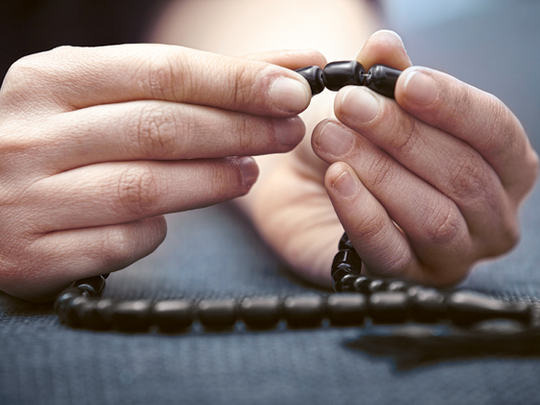
Ramadan is a time for much introspection for many Muslims, and people resolve to improve their lives at this time, not just over the month, but over a lifetime.
As resolutions go, Ramadan is to Muslims what New Year is to the rest of the world. But more so — after all when you make resolutions in December, you don’t really spend all of January working them into perfection.
A UAE-based blogger who goes by the name of Umm Muawiyah has an entire list of things that she posts under the head of ‘yes, we can’.
The list includes everything from losing 5kg of weight, sleeping fewer hours every day, and avoiding junk food, ice creams and chocolate, to saying yes to salads, yoghurt, eggs, fruit, water and milk. Her what-not-to-do list for her readers includes reading sensational news, doing crosswords, playing pool, shopping, smoking, watching television and too much housework. Instead, she prescribes reading, praying, simple acts of kindness and donating to charity.
“Apart from fasting, Ramadan is the month where we spend a lot of time praying and reciting the Quran and pondering over it. The focus is on nourishing one’s soul, not nourishing one’s body,” she says.
American sisters and Dubai residents, Zeba (29) and Zarina (27) Khan, call it their “spiritual boot camp.”
A sense of balance
Fahd Sheikh, Pakistani, 30, a resident of Dubai, made a different kind of resolution. “We would go in seclusion in the last ten days of Ramadan when all you do is remember God. That did change me quite a lot. It’s all about balancing. The seclusion helped me balance my life,” he says.
Achieving balance is often a goal, whether by balancing the need to be alone or to reconnect. UAE national Hassan Al Marashi, 22, says, “I try to get in touch with old friends and family whom I have not seen in a while. It’s something I have always done. I visit friends who have set up tents. It’s a time for friends and family. Last year I managed to connect with friends whom I had not seen since school days, now that I am in college. And I met some of my uncles who I had not met, for a while.”
Things take on a new meaning during the holy month. Even fasting, they say, is different from just staying hungry. Those who fast — Muslims and non-Muslims — say that there comes a point during the day when it’s no longer about being hungry. Many speak about being on a higher plane.
In fact, Zarina even does some preliminary fasting and weans herself off caffeine a couple of days before Ramadan.
“During Ramadan you are able to function without food and drink, as compared to, say, during a diet, when you are ready to gnaw your arm in a couple of hours,” says Zarina, a writer and frequent dieter. One of her Ramadan triumphs was at university when she rode a bicycle everyday for ten miles to get to class and back while attending lectures between 8am and 8pm.
“In the end you feel that you have had help and you don’t want to waste it by being obnoxious. You feel like a superhuman version of yourself,” she says.
The lifetime plan
Zeba, mother of three and who runs an autism centre, says the month helps her create long-term goals. “It’s about resolving to control your appetite, temper and the inner self called nafs. By the time Ramadan ends you realise that if you can be patient while you are starving, you can be patient otherwise as well,” she says. Umm Muawiyah says her resolutions are really life goals. “I have goals for the year, month and week. I also have pre-Ramadan, Ramadan and post-Ramadan goals based on life and yearly goals. So they’re not resolutions as such but goals that I wish to attain before, during and after Ramadan.”
While some use Ramadan for personal and spiritual growth, resolutions include food-based ones such as not eating too much and eating healthy. Giving more to charity, not quarrelling, swearing or gossiping, and trying to improve relationships make for some common resolutions. In addition, producing less waste and recycling are common
resolutions today.
Zarina says: “Some of us have more willpower; some of us have more faith. People who have more faith can accomplish things during Ramadan — because faith motivates you.”











